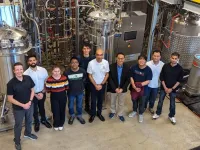(Press-News.org) A device has been created that could carry out Clinical Breast Examinations (CBE).
The manipulator, designed by a team at the University of Bristol and based at the Bristol Robotics Laboratory, is able to apply very specific forces over a range similar to forces used by human examiners and can detect lumps using sensor technology at larger depths than before.
This could revolutionise how women monitor their breast health by giving them access to safe electronic CBEs, located in easily accessible places, such as pharmacies and health centres, which provide accurate results.
Precision, repeatability and accuracy are of paramount importance in these tactile medical examinations to ensure favourable patient outcomes. A range of automatic and semi-automatic devices have been proposed to aid with optimising this task, particularly for difficult to detect and hard to reach situations such as during minimally invasive surgery.
The research team included a mix of postgraduate and undergraduate researchers, supervised by Dr Antonia Tzemanaki from Bristol Robotics Laboratory. Lead author George Jenkinson explained: “There are conflicting ideas about how useful carrying out Clinical Breast Examinations (CBE) are for the health outcomes of the population.
“It’s generally agreed upon that if it is well performed, then it can be a very useful and low risk diagnostic technique.
“There have been a few attempts in the past to use technology to improve the standard to which healthcare professionals can perform a CBE by having a robot or electronic device physically palpate breast tissue. But the last decade or so of technological advances in manipulation and sensor technology mean that we are now in a better position to do this.
“The first question that we want to answer as part of this is whether a specialised manipulator can be demonstrated to have the dexterity necessary to palpate a realistic breast size and shape.”
The team created their manipulator using 3D printing and other Computerised Numerical Control techniques and employed a combination of laboratory experiments and simulated experiments on a fake (silicone) breast and its digital twin, both modelled on a volunteer at the Simulation and Modelling in Medicine and Surgery research group at Imperial College London.
The simulations allowed the team to perform thousands of palpations and test lots of hypothetical scenarios such as calculating the difference in efficiency when using two, three, or four sensors at the same time. In the lab, they were able to carry out the experiments on the silicone breast to demonstrate the simulations were accurate and to experimentally discover the forces for the real equipment.
George added: “We hope that the research can contribute to and complement the arsenal of techniques used to diagnose breast cancer, and to generate a large amount of data associated with it that may be useful in trying to identify large scale trends that could help diagnose breast cancer early.
“One advantage that some doctors have mentioned anecdotally is that this could provide a low-risk way to objectively record health data. This could be used, for example, to compare successive examinations more easily, or as part of the information packet sent to a specialist if a patient is referred for further examination.”
As a next step, the team will combine CBE techniques learned from professionals with AI, and fully equip the manipulator with sensors to determine the effectiveness of the whole system at identifying potential cancer risks.
The ultimate goal is that the device and sensors will have the capability to detect lumps more accurately and deeper than it is possible only from applying human touch. It could also be combined with other existing techniques, such as ultrasound examination.
“So far we have laid all of the groundwork,” said George. “We have shown that our robotic system has the dexterity necessary to carry out a clinical breast examination – we hope that in the future this could be a real help in diagnosing cancers early.”
This research was a part of project ARTEMIS, funded by Cancer Research UK and supported by EPSRC.
Papers:
‘A robotIc Radial palpatIon mechaniSm for breast examination (IRIS)’ by George Jenkinson et al which was presented at the RO-MAN conference.
END
New robot could help diagnose breast cancer early
2023-10-04
ELSE PRESS RELEASES FROM THIS DATE:
A prehistoric cosmic airburst preceded the advent of agriculture in the Levant
2023-10-04
Agriculture in Syria started with a bang 12,800 years ago as a fragmented comet slammed into the Earth’s atmosphere. The explosion and subsequent environmental changes forced hunter-gatherers in the prehistoric settlement of Abu Hureyra to adopt agricultural practices to boost their chances for survival.
That’s the assertion made by an international group of scientists in one of four related research papers, all appearing in the journal Science Open: Airbursts and Cratering Impacts. The papers ...
Is universal screening for type 1 diabetes around the corner?
2023-10-04
The the latest data on universal screening for type 1 diabetes (T1D) is reveiwed in a session at this year’s Annual Meeting of the European Association for the Study of Diabetes (EASD) in Hamburg, Germany (2-6 October). The talk will be given by Dr Emily K. Sims, Associate Professor of Pediatrics, Center for Diabetes and Metabolic Diseases, Indiana University School of Medicine, Indianapolis, IN, USA.
Research by various groups has established that individuals with multiple islet autoantibodies (biomarkers showing that the body is attacking and killing its own insulin producing beta cells in ...
Metabolic signature can help predict which smokers will develop type 2 diabetes
2023-10-04
New research being presented at this year’s Annual Meeting of The European Association for the Study of Diabetes (EASD), Hamburg (2-6 Oct) finds that cigarette smoking increases the risk of developing type 2 diabetes in part by affecting a variety of metabolites—small chemicals produced in the processes of metabolism—that circulate in the bloodstream.
The influence of these metabolic changes on diabetes risk appears to be amplified in individuals with genetic susceptibility to type 2 diabetes or insulin resistance.
The analysis of over 93,000 UK Biobank participants also identified a metabolic ...
Metabolically healthy obesity: fact or fiction?
2023-10-04
A session at this year’s Annual Meeting of the European Association for the Study of Diabetes will explore the latest data on the concept of metabolically healthy obesity (MHO) – more commonly known by the public as ‘fat but fit’. Professor Matthias Blüher, University of Leipzig, Leipzig and Helmholtz Center Munich, Germany will explain how we define MHO and ask if it can really be described as healthy.
“Some 15-20% of people living with obesity have none ...
Emergency department screening could detect thousands of undiagnosed prediabetes and diabetes cases, UK study suggests
2023-10-04
The introduction of screening for type 2 diabetes in Accident and Emergency (A&E) departments could uncover thousands of previously undiagnosed cases every year, suggests new research being presented at this year’s Annual Meeting of The European Association for the Study of Diabetes (EASD), Hamburg (2-6 Oct).
“Early diagnosis is the best way to avoid the devastating complications of type 2 diabetes, and offers the best chance of living a long and healthy life”, says Professor Edward Jude, Tameside and Glossop Integrated Care NHS Foundation Trust, UK. “Symptoms of type 2 diabetes may be absent and can be tricky ...
New stem cell-derived islet therapy improves blood sugar control in all treated patients, with three achieving insulin independence
2023-10-04
Six adults with type 1 diabetes (T1D) treated with stem cell-derived islet cells (VX-880) have shown improved blood sugar control with three participants achieving insulin independence, according to new research being presented at this year’s Annual Meeting of The European Association for the Study of Diabetes (EASD), Hamburg (2-6 Oct).
All patients treated with VX-880 have demonstrated improved glycaemic control, as evidenced by elimination of severe hypoglycaemia (low blood sugar), improvements in HbA1c (a measure of long-term sugar levels) and the amount of time their ...
New pipeline makes valuable organic acid from plants — saving money and emissions
2023-10-03
In a breakthrough for environmentally friendly chemical production, researchers at the Center for Advanced Bioenergy and Bioproducts Innovation (CABBI) have developed an economical way to make succinic acid, an important industrial chemical, from sugarcane.
The team of University of Illinois and Princeton University researchers created a cost-effective, end-to-end pipeline for this valuable organic acid by engineering a tough, acid-tolerant yeast as the fermenting agent, avoiding costly steps in downstream processing. Succinic acid is a widely ...
PARMESAN: An AI-based predictive tool to find new treatments for genetic disorders
2023-10-03
To discover new treatments for genetic disorders, scientists need a thorough knowledge of prior literature to determine the best gene/protein targets and the most promising drugs to test. However, biomedical literature is growing at an explosive rate and often contains conflicting information, making it increasingly time-consuming for researchers to conduct a complete and thorough review.
To address this challenge, Cole Deisseroth, a graduate student enrolled in the M.D./Ph.D. program and mentored by Drs. Huda Zoghbi and Zhandong Liu at the Jan and Duncan ...
PPPL awarded $5 million to lead an Energy Earthshot Research Center focused on clean hydrogen
2023-10-03
Lessening the effects of climate change will require a variety of innovations and a lot of ingenuity. Now, a new center led by the U.S. Department of Energy’s (DOE) Princeton Plasma Physics Laboratory (PPPL) will help these efforts by advancing the understanding of plasma-based clean hydrogen production.
PPPL was selected to lead a DOE Energy Earthshot Research Center (EERC) as part of the Hydrogen Shot™, which aims to reduce the cost of hydrogen by 80%. With funding from the DOE’s Office of Science, the EERCs support fundamental ...
Illinois-led project to sequence 400 soybean genomes, improve future crops
2023-10-03
As a source of protein and biodiesel for cleaner renewable energy, soybean is an important crop worldwide. But is it performing to its full potential? An ambitious effort led by the University of Illinois Urbana-Champaign and the U.S. Department of Energy Joint Genome Institute (JGI) will sequence 400 soybean genomes to develop a “pangenome” — an attempt to characterize all the useful diversity in the genome to create an even more robust and resilient crop.
The soybean pangenome project will sequence and analyze at least 50 soybean genomes from cultivated lines and wild relatives at reference quality, the gold standard of modern sequencing. A further ...





